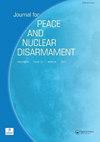False Sense of Supremacy: Emerging Technologies, the War in Ukraine, and the Risk of Nuclear Escalation
IF 1.4
Q4 INTERNATIONAL RELATIONS
引用次数: 0
Abstract
ABSTRACT How will emerging technologies impact crisis escalation? What has been the escalatory – or de-escalatory – effect of emerging technologies in contemporary crises? And can the use of emerging technologies increase risks of nuclear use? To answer these questions, we use the ongoing war in Ukraine as a case study to identify how emerging technologies are being used in modern conflicts and the associated risks of escalation, potentially to include nuclear use. We argue that emerging technologies gave Russia a false sense of supremacy in the lead-up to the war in Ukraine and have largely failed to deliver Russia battlefield victories. As a result, Moscow has increased reliance on nuclear weapons and nuclear threats. This reliance could be exacerbated in the aftermath of the war in Ukraine when Russia is conventionally weakened. Therefore, it is not the technologies themselves that increase risks of escalation, but their impact on decisionmakers’ perceptions of the potential costs of offensive military operations and escalation. Nonetheless, the role of emerging technologies in Ukraine should not inspire complacency because of the impact of new actors, new escalation pathways, and compressed timescales. These trends will have implications for nuclear policy and require more inclusive approaches to risk reduction and arms control, to include an increased focus on behaviors rather than capabilities.虚假的霸权感:新兴技术、乌克兰战争和核升级风险
摘要:新兴技术将如何影响危机升级?新兴技术在当代危机中的升级或去升级效应是什么?新兴技术的使用会增加核使用的风险吗?为了回答这些问题,我们以正在进行的乌克兰战争为案例研究,以确定新兴技术如何在现代冲突中使用,以及相关的升级风险,可能包括核使用。我们认为,在乌克兰战争之前,新兴技术给了俄罗斯一种虚假的霸权感,在很大程度上未能给俄罗斯带来战场胜利。因此,莫斯科更加依赖核武器和核威胁。乌克兰战争结束后,当俄罗斯传统上被削弱时,这种依赖可能会加剧。因此,增加升级风险的不是技术本身,而是它们对决策者对进攻性军事行动和升级潜在成本的看法的影响。尽管如此,新兴技术在乌克兰的作用不应因为新的参与者、新的升级途径和压缩的时间表的影响而自满。这些趋势将对核政策产生影响,需要采取更具包容性的方法来减少风险和军备控制,包括更加关注行为而非能力。
本文章由计算机程序翻译,如有差异,请以英文原文为准。
求助全文
约1分钟内获得全文
求助全文
来源期刊

Journal for Peace and Nuclear Disarmament
INTERNATIONAL RELATIONS-
CiteScore
1.30
自引率
0.00%
发文量
36
审稿时长
12 weeks
 求助内容:
求助内容: 应助结果提醒方式:
应助结果提醒方式:


